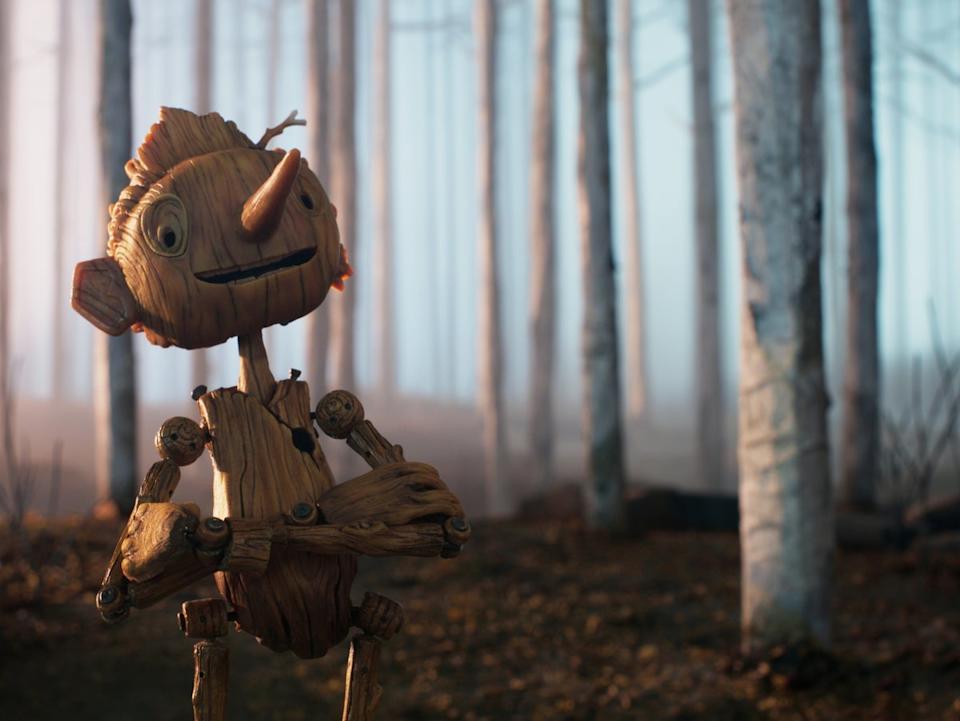Guillermo del Toro’s Pinocchio review: The most beautiful stop-motion animation film in years

Why is cinema so fascinated with the little wooden boy who wants to live as flesh and bone? Guillermo del Toro’s Pinocchio is already the second adaptation of the fairytale released this year, following the dead-eyed, live-action monstrosity that flopped onto Disney Plus three months ago. But for those who seek to do more than exploit nostalgia, this tale offers a special kind of wonderment.
Carlo Collodi’s 1883 novel served as a moral warning to Italian peasants: if they didn’t work hard, they might just end up like poor Pinocchio, who was turned into a donkey as punishment for his impulsiveness. But, through his many iterations, the puppet child has transformed into the antithesis of Frankenstein’s Monster – proof that mankind’s ability to craft life out of the lifeless can be a source of joy and not an act of reckless pride.
Del Toro, the man behind Pan’s Labyrinth, The Shape of Water and this year’s Nightmare Alley, has a deep affection for monstrosities of all breeds. Co-directing with Mark Gustafson, who worked as supervising animator on Wes Anderson’s Fantastic Mr Fox, Del Toro has embraced the poetry in craftsmanship and ushered in the most beautiful stop-motion animation film in years.
There’s a magnificent, painterly quality to the way moonlight filters through the rafters, or how tumultuous waves lap up against the gnarled bulk of the sea creature Monstro. The characters here have the same rustic, carved look of Geppetto’s cuckoo clock figurines, though the way their jaws clench and lips snarl gives a real feeling of muscles beneath the skin.
Beyond del Toro’s interest in Pinocchio’s innate unnaturalness, and the tender handiwork that created him, there’s little here that actually ties him to Collodi’s original story. The film is much richer for it. Alongside co-writer Patrick McHale, the director has returned to one of his most prominent themes: the searing inhumanity of fascism and its rigorous ideas of conformity and masculinity. But this time it’s a musical, with delicate, jewellery-box ditties composed by Alexandre Desplat.
Reframed as a story about Mussolini’s Italy in the Thirties, the film sees Geppetto (David Bradley) drunkenly sculpt Pinocchio (Gregory Mann) out of blind rage at his own fate, having lost his beloved son Carlo under the darkest of circumstances. Inspired by Gris Grimly’s illustrations from a 2002 edition of Collodi’s novel, this Pinocchio is extra rickety, and very Del Toro – all broken joints and exposed nails.
The Blue Fairy, who grants him sentience, now appears as an ethereal, doe-eyed spirit of the mountains (fittingly voiced by Tilda Swinton). Her sister (also Swinton), who rules the underworld, is a sphinx-like creature, served by a small force of zombie rabbits. Even Pinocchio’s guide and conscience, Sebastian J Cricket, (Ewan McGregor) has become a penniless writer (with shades of McGregor’s Moulin Rouge role) whose constant misfortune might read as a commentary on the scourging of intellectuals under authoritarian regimes.
That may sound like a lot for a film still (somewhat) aimed at kids, but Del Toro and McHale’s frankness around these topics speaks directly to the power of a child’s innocence. Pinocchio is branded a dissident purely because he’s unacquainted with the cruel follies of adult society. The town’s fascist official (Ron Perlman) may not turn boys into donkeys, but he does force them into youth camps to play-act at war. In unconscious rebellion, the recruits descend into giggles when they realise the futility of their game. That may not be Collodi’s invention, but it’s a sign his story’s enduring power comes directly from its malleability. The wooden boy belongs wholeheartedly to he who carves him.
Dir: Guillermo del Toro, Mark Gustafson. Starring: Ewan McGregor, David Bradley, Gregory Mann, Ron Perlman, Finn Wolfhard, Cate Blanchett, Christoph Waltz, Tilda Swinton. PG, 117 minutes.
‘Guillermo del Toro’s Pinocchio’ is streaming on Netflix now

 money
money 